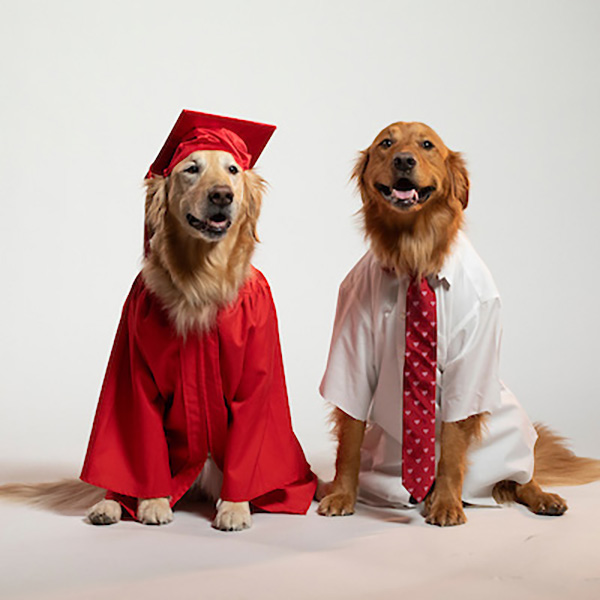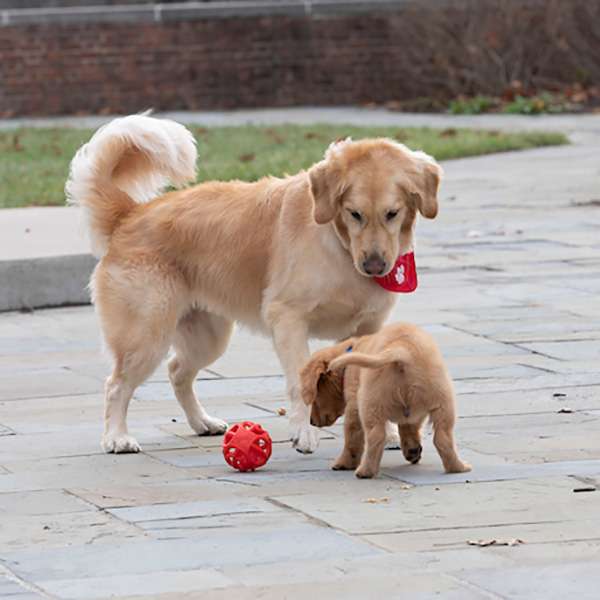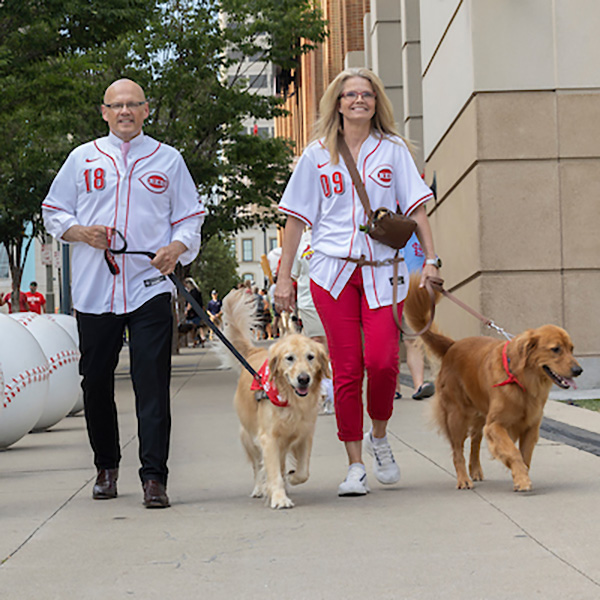Crawfords’ Ivy is now a therapy dog like younger brother, Newton
The popular golden retriever returned to school and ‘graduated’ in December

It’s never too late to go back to school.
Or change your major.
Take it from Ivy, who was adopted by Miami University President Gregory Crawford and University Ambassador Dr. Renate Crawford when she was 1 year old after the golden retriever didn’t pass service dog training at 4 Paws for Ability.
Now 8, Ivy went back to school in December and became certified as a therapy dog through Therapy Dogs International (TDI). She joins the Crawfords’ 4-year-old golden retriever, Newton, who became certified by TDI three years ago.
"Newton and Ivy have a great life — walking around campus, interacting with students and the community, constantly getting attention and being petted,” President Crawford said. “They love it, and the students do, too."
Renate Crawford — who took Newton and Ivy through the required training and is certified as the therapy dog handler for each — said President Crawford was “an enthusiastic supporter and occasional tutor.”
This semester, Ivy will start making the rounds in her new role as Renate Crawford begins taking Newton or Ivy — not both at the same time — to various therapy dog events.
“For the large campus therapy dog events, I plan to do one hour with Newton, go home to exchange dogs, and then Ivy will get her turn."

Connecting with students
Newton has been a busy boy these past three years.
“He loves his job and stays very busy working with the counseling center, visiting residence halls, student groups, student athletes, and also engaging with the community and K-12 schools,” she said, noting they go to Talawanda and Hamilton schools.
But during the past three years, she sensed Ivy wanted to join in on the fun. The Crawfords felt it was time to do something about it.
They always joked that Ivy didn’t really “flunk out,” but after the service dog exam, she took time off before changing her major.
Animals can have a positive impact on calming, reducing stress, and uplifting spirits, Renate Crawford said.
“When Newton is working, it gives me joy and a warm heart to know that Newton is making a student’s day a little better or calming them down. So many students miss their pets at home, so Ivy and Newton fill in as a surrogate for them — and get a lot of love (and honor) from our students."
So many of the therapy dogs and their volunteer handlers are campus regulars, including Luke Skywalker, Brownie, Hadley, Gitli, and many more. Some, like Okie, Poppy, and Duck, even have weekly office hours at the Clinical Health and Wellness Center.
Renate Crawford noted that Ivy and Newton have very different personalities.
Newton — named for Sir Isaac Newton by the Crawfords, who are both physicists — is more attached to her. He has thrived on the attention of being a therapy dog.
“Newton has no cares in the world,” she said, noting he is goofy and sports a big smile. “He loves everybody.”
Ivy, who is more attached to the president, is reserved and incredibly loyal.
“Ivy contemplates all the grand global challenges,” she joked.

Making an impact
Renate Crawford loves being a therapy dog handler because of the impact she has seen it have on students.
“(Newton) is so friendly with a lot of character that students love to engage with. I love to bring that engagement to campus,” she said. “He honestly misses the students during the summer and J-Term. Our normal campus walks during the semester are more like walking petting sessions.”
Ivy’s name is a nod to Miami’s distinction as a Public Ivy, which means it offers an Ivy League-level education at a public university price.
But how did she fare with Miami’s 4-year graduation rate, consistently ranked among the top public universities in the nation?
“We joked a bit that we won’t include Ivy in our graduation rate since it took her 8 years!” Renate Crawford said.
So how did Ivy like going back to school?
“Ivy has the hardest time with the ‘leave it’ command when we walk past treats, which I had laid out on the ground,” she said. “If she was supposed to come to me from a sit-stay and walk past, ‘leaving’ the treats on the ground, she'd either take an alternate route or totally divert her head from looking at the treats. Watching it was super funny; she tried her best to remove herself from temptation.”
Because Ivy is super food-motivated, that helped with training at home after class sessions, she added. But it usually pulled Newton into the training sessions, too.
“Newton was a bit confused about all the attention and treats for Ivy, so he was always right by her side following the commands. I guess he was auditing the course,” she quipped.